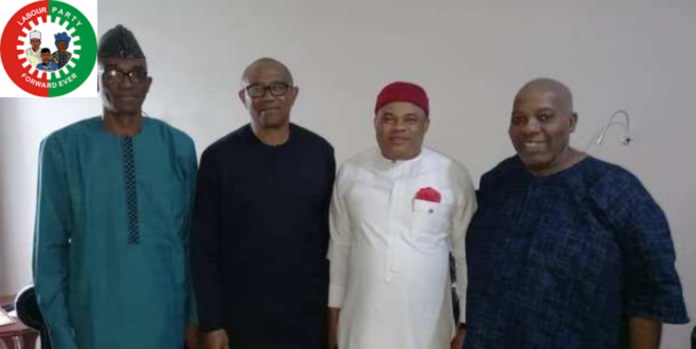“Doyin Okupe dumps Labour Party” was the screaming headline of one of the major dailies on 8 January. This was quite an apt one, as far as headlines go. One of the two main reasons he gave for dumping the party confirms some of the concerns I have raised several times as a former leading member of the LP. The other is rather laughable.
What are these two reasons? First, he pointed out that LP had been nothing more than a “special purpose vehicle” (SPV) for him, Peter Obi “and others” who left the PDP “abruptly” (when it was clear that Peter Obi was not going to get the PDP presidential ticket. Second, he argues that LP “is ideologically rooted in the left of the centre” whilst he has “been a rightist and a liberal democrat” all his life.
Furthermore, it is clear that this reason only holds significance now because they lost the election they relied on LP for. So, if they had won, he would, of course, have stayed in the party. This is the crassest demonstration of opportunism. However, one need not be clairvoyant to see that his likes would have moulded the programmes and policies of the party in their own image and not any seemingly social democratic ideology if they had won the elections with the “LP-SPV.”
But more laughable than Okupe’s resignation is the response from the LP publicity secretary, Obiora Ifoh. According to him, there is no big deal about Doyin Okupe leaving because “he is a Liberal Democrat, while the Labour Party is a Social Democrat” (sic). In addition, he noted that the carpet bagger “has always been a PDP man, so the Labour Party expects that he will return to anywhere he wants to be.”
We recall though that Doyin Okupe was far more than just a member when he joined the LP. The party immediately appointed him as the Director General of the party’s presidential campaign. However, this was short-lived. This was because a Federal High Court in Abuja convicted him on charges of money laundering. The court gave him an option of two years in jail or N500,000. Not surprisingly, like the “big man” thief he is, he effortlessly picked the latter.
This little playlet of the absurd is little more than the symptoms, though. We need to understand the underlying ailment, and a terminal one at that, of the Labour Party as a supposed workers’ party. Like all sicknesses, it is impossible to make any useful prognosis without a careful diagnosis.
Many assume that the Labour Party is a workers’ party and that it genuinely represents the working class. The short answer to these two assumptions is that it is neither. “Labour Party does not stand for workers.”
This is not merely because the party had become “an ‘orphanage’ for capitalist politicians who lose ground in the traditional capitalist political parties since 2007.” The seeds of the malaise of the party as a party that is anything but a workers’ party were sowed at its very conception and birth.
When it was formed in 2002, it was defined as a “Party for Social Democracy.” This was because the trade union leadership that established it was not comfortable with radical politics. PSD failed to join the struggle to expand the electoral space which was waged by parties like the National Conscience Party (NCP), People’s Redemption Party (PRP) and Democratic Alternative (DA) that year.
But it benefited from that struggle and became a registered party. However, with just months to the 2003 elections, its participation was very limited. In 2004, the party changed its name from the Party for Social Democracy to Labour Party.
By 2007, it engaged in the general elections but did not pursue the class interest of workers. There was a massive influx of politicians who had lost primaries in the traditional bourgeois parties, or who otherwise knew they could not get tickets there. They came with their loyalists to define the party’s structure. There was a significant change in the class composition of its leadership at the state and local levels.
Trade unionists and ex-unionists who took up positions in the party structures were also mainly those whose ideological orientations were no different from those of the bourgeoisie (even with some that mouthed and continue to mouth left slogans).
Olusegun Mimiko emerged as Ondo State Governor on the LP platform. This was a game changer that strengthened the arm of the most conservative sections of the party, led by its chairman. This played out with a new constitution that was adopted by the 2009 Convention. This was a forerunner phenomenon to what we have now as the Obidient movement.
Peter Obi’s political rise as a supposed alternative to the traditional capitalist political parties reflects the times. There is a total loss of confidence in the APC and PDP. He seems to be the best that can be found in the ranks of the ruling class. Some sections of the left believe they can influence the direction that the mass Obi brings to the party will take. But they lack any significance within the party to even be able to pose any challenge to the dominance of Obi’s neoliberal ideas. They thus end up supporting ideas alien to the emancipation of working-class people at a time when, more than ever, the need for revolutionary system change should be posed and popularised within the working class.
by Baba AYE









